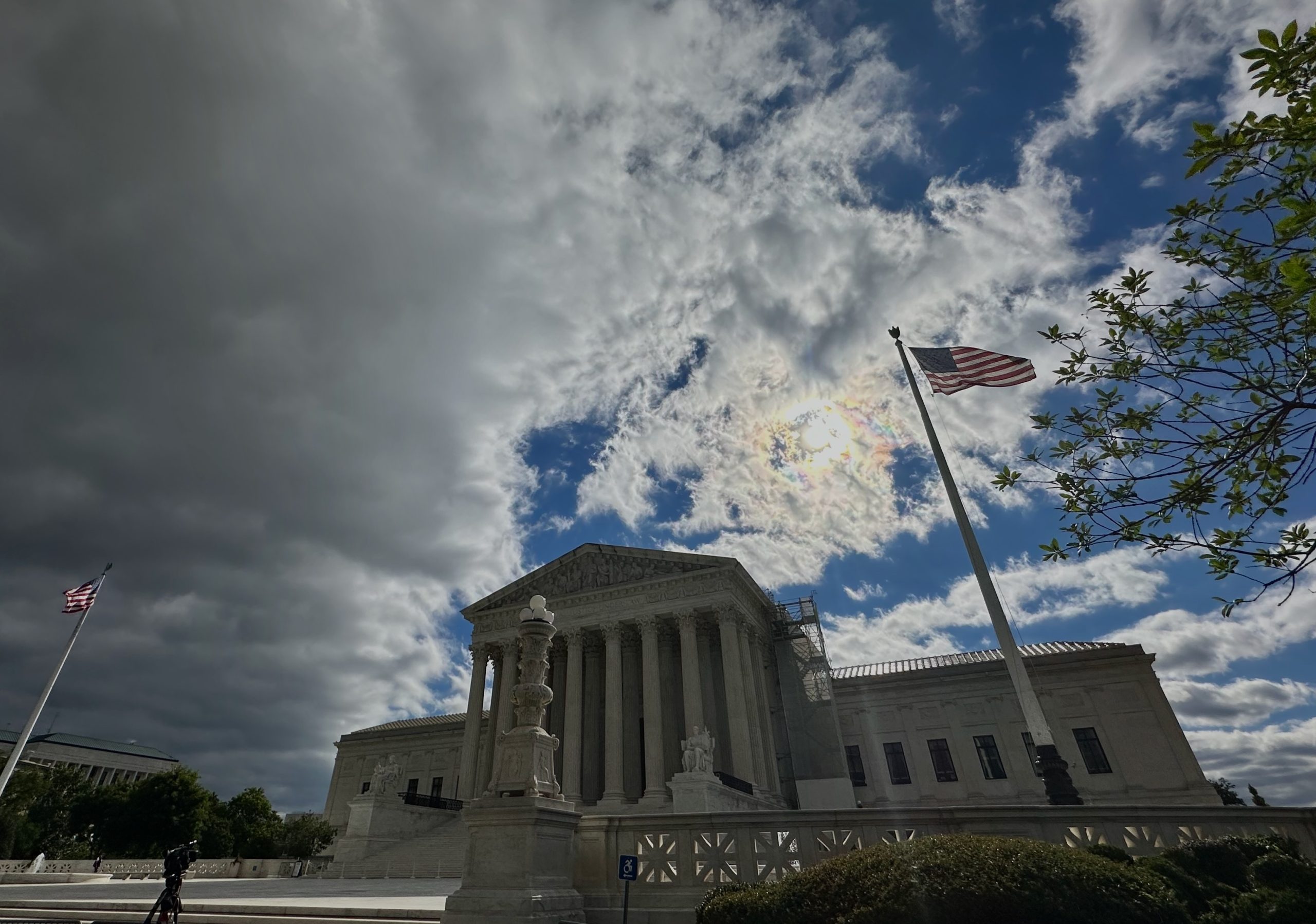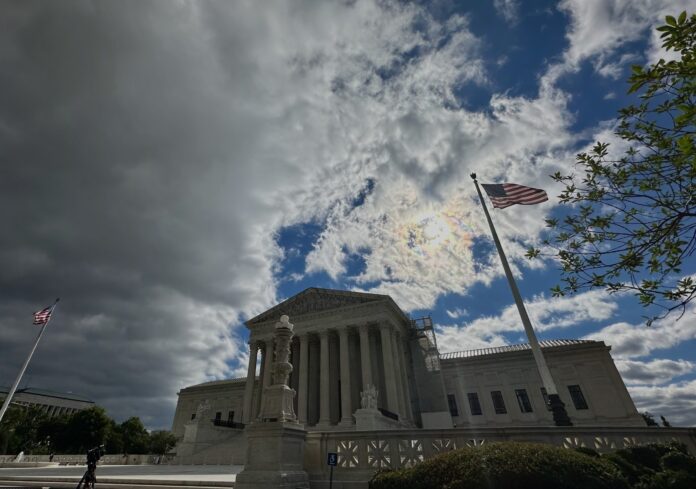ARGUMENT ANALYSIS
on Jan 24, 2025
at 12:53 pm

The justices heard Food and Drug Administration v. R.J. Reynolds Vapor Co. on Tuesday. (Katie Barlow)
At oral arguments earlier this week the Supreme Court was skeptical of the Food and Drug Administration’s effort to block a North Carolina-based company from challenging the denial of its application to market e-cigarettes in the conservative U.S. Court of Appeals for the 5th Circuit, based in Louisiana.
During 72 minutes of oral arguments, almost all of the justices peppered Vivek Suri, the assistant to the U.S. solicitor general representing the FDA, with a barrage of questions. Ryan Watson, who argued on behalf of R.J. Reynolds Vapor Company and a group of retailers based in Texas and Mississippi, primarily fielded questions from just two justices, Justices Sonia Sotomayor and Ketanji Brown Jackson – a promising sign for his clients.
The question comes to the court as part of the FDA’s efforts to regulate the multibillion-dollar vaping industry. In 2009, Congress passed the Family Smoking Prevention and Tobacco Control Act, which gives the FDA the power to regulate tobacco products and requires manufacturers to obtain the FDA’s permission before putting a new tobacco product on the market. In 2016, the FDA issued a rule indicating that the law applies to e-cigarettes and e-liquids.
RJR Vapor filed an application for permission to sell its popular menthol-flavored Vuse brand e-cigarettes. Under the Tobacco Control Act, when the FDA denies a marketing request, “any person adversely affected†by that denial can “file a petition for judicial review of such regulation or denial with the United States Court of Appeals for the District of Columbia Circuit or for the circuit in which such person resides†– which, for a corporation, is usually where it is incorporated – “or has their principal place of business.â€
RJR Vapor is incorporated and located in North Carolina, where challenges to the FDA’s denials of applications to sell e-cigarettes had been unsuccessful. RJR Vapor went instead to the 5th Circuit, which had already set aside the FDA’s rejection of two other companies’ requests to market flavored vape liquids. (The Supreme Court heard arguments in December in the FDA’s challenge to the 5th Circuit’s ruling in that case, but it has not yet issued a decision.) Its petition was joined by Avail Vapor, a Texas store that sells its products, as well as a trade association for Mississippi gas stations and convenience stores that sell menthol-flavored Vuse e-cigarettes.
The 5th Circuit rejected the FDA’s motion to move the case to the D.C. Circuit. It reasoned that the retailers were “undisputedly in this circuit†and “adversely affected by the denial†because (among other things) Avail Vapor has said that it will go out of business if it cannot sell the Vuse products.
At Tuesday’s oral argument, Suri told the justices that the 5th Circuit’s decision “has effectively nullified the Tobacco Control Act’s restrictions on†where challenges to the denial of a marketing application may be filed. The ruling by the court of appeals, he said, allows an applicant to “challenge the denial in any circuit anywhere in the country so long as it can enlist a local retailer willing to join its petition.â€
There are two problems with that holding, he asserted. The first is that only the entity that actually applied for permission to market the tobacco product can challenge the denial of an application. “Retailers,†he stressed, “are bystanders to the application process.†But even if the retailers were allowed to sue, he continued, “applicants don’t get to ride in on their coattails†and rely on the retailers’ residence to establish that their case is properly in the 5th Circuit. “Venue must be established separately for each party†– that is, each party may show that it can file its challenge in the forum there.
But most of the justices were dubious that the provision at the center of the case only allows the applicants – those seeking to market tobacco products – to challenge the denial of their applications. Justice Clarence Thomas was the first to voice this skepticism, asking Suri why, if the judicial review provision only applies to applicants, it refers to “any person adversely affected†by the denial.
Suri countered that the provision merely directs courts to determine, based on the law’s structure, who is adversely affected. When the FDA denies marketing approval, he suggested, that only has an adverse effect on the applicant itself – as shown by the fact that retailers do not participate in the process leading up to the denial of an application and are not notified of the denial itself. “It is implausible,†Suri emphasized, that Congress set up a system in which someone, the retailers, would have a right to challenge an agency order but wouldn’t have a right to be notified of the order in the first place.â€
Justice Sonia Sotomayor appeared to agree. She pressed Ryan Watson, representing the challengers, to explain what additional role, compared to the manufacturer, the retailers could play in the process – and, as a result, why Congress might have wanted to include them among the entities that could challenge the denial of a marketing application. “What arguments could you raise,†she queried, “that would be different than the manufacturer?â€
Chief Justice John Roberts, however, was unconvinced. “I think it’s a bit much,†he remarked to Suri, “to call†retailers “bystanders†when “their business depends upon†their ability to market products like the menthol-flavored Vuse e-cigarettes. Indeed, Roberts reflected, when the “whole point†of the government’s inquiry in deciding whether to grant or deny marketing authorization is whether the products will be sold to the public, the retailers might be “the most likely people†to challenge the denial of authorization.
Justice Brett Kavanaugh echoed Roberts’ doubt. He observed that, under the federal law governing administrative agencies, the term “adversely affected†normally sweeps in competitors and others in the distribution chain, such as retailers and distributors.
Suri acknowledged that the phrase “adversely affected†“certainly includes competitors in a wide variety of contexts.†But he sought to distinguish those contexts from the one before the court on Tuesday, telling them that “this is a very different circumstance†involving “an ally of the directly regulated party.â€
Justice Elena Kagan asked Suri whether the denial of an application to market a tobacco product adversely affects anyone other than the applicant. When Suri responded “no,†she suggested that Congress could have simply drafted the law to refer to “the applicant†instead, and she noted that Congress had done exactly that for a different provision, involving judicial review for decisions requiring the withdrawal of tobacco products from the market.
Along with Sotomayor, Jackson was the only other justice who appeared sympathetic to the government’s position. She saw things differently. She observed that retailers “have a significant interest once the product is on the market†and they are selling it. But even then, she said, when “they would be clearly harmed,†Congress has not allowed the retailers to challenge the withdrawal of the product from the market. It would seem “peculiar,†she told Watson, that retailers can’t sue to challenge the withdrawal of a product from the market but could challenge the denial of a marketing application.
Justice Amy Coney Barrett questioned whether the court should even address the second question that the government had raised: whether each challenger must show that it has filed its petition for review in the correct place, or whether RJR Vapor can instead rely on the retailers’ petition to challenge the FDA’s decision in the 5th Circuit. She observed that the courts of appeals were not divided on the question – a classic scenario in which the Supreme Court is likely to weigh in to resolve a conflict among the lower courts.
Suri characterized the extent to which e-cigarette manufacturers have sought to file their petitions for review in the 5th Circuit as “quite remarkable.†In 2024, he told the justices, there were “about 14 petitions for review filed by e-cigarette companies under†the TCA in that circuit.
Several justices, including Barrett, pressed Suri about the scope of a potential ruling for the government on this question. “The government gets sued in a lot of places,†she noted. “And this would matter beyond just the TCA, correct?â€
Suri conceded that the court could avoid a broader ruling by focusing on the language of the Tobacco Control Act. The key part of the provision at issue before the court, he explained, is its requirement that an adversely affected person file a petition for review in the circuit where it resides or has its principal place of business. The use of the verb “file,†he suggested, means that an entity can’t join someone else’s petition, but must itself either live in that circuit or have its business there.
Justice Samuel Alito also enquired about the scope of the government’s interpretation, pointing to a “friend of the court†brief positing that there are “as many as 650 review provisions that are similar to the one†at issue in this case.
Suri pushed back, although he agreed that at least two other federal laws – the Investment Advisors Act and the Natural Gas Act – do have similar wording. Â
Watson countered that the government’s interpretation could indeed sweep quite broadly. He contended that language at issue in this case is “quite similar†to both the Hobbs Act, which bars robbery and extortion, and the general law governing venue in federal courts, “all of which have been construed to allow just one party to establish venue.â€
Thomas was unsympathetic to the government’s plight here too. “As a practical matter,†he asked Suri, “why is it inconvenient for the government to litigate in one circuit instead of another?â€
Suri told the justices that this was not a question of convenience, but instead “about Congress’s choice in the statute†to delineate where cases can be brought. “Almost all of the cases are being filed in the Fifth Circuit,†he emphasized.
Justice Neil Gorsuch questioned whether the court’s ruling would have any practical effect in the FDA’s e-cigarette disputes, in light of the government’s concession that litigating in the 5th Circuit does not create logistical problems. Even if the manufacturers couldn’t piggyback directly off the retailers’ petitions to challenge the FDA’s denial of the marketing application, he asked, couldn’t manufacturers just fund the retailers’ lawsuits anyway, effectively leaving the dispute in the same place?
Watson pressed a similar point, telling the justices that if the court agrees with the challengers that the retailers can sue, it doesn’t need to go any further. First, he explained, the government waived the right to argue that each party must show that it is properly in the 5th Circuit. But in any event, because under a separate federal procedural law RJR Vapor and the retailers will still wind up in the 5th Circuit challenging the marketing denial order, the Supreme Court’s decision won’t “make a difference in this case.â€
A decision in the case is expected by summer.
This article was originally published at Howe on the Court.Â





